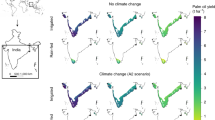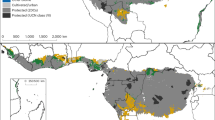Abstract
Facing criticism that Indonesia’s oil palm industry causes deforestation, government and industry representatives have highlighted the role of oil palm in improving the livelihoods of millions of oil palm smallholders, reducing poverty and meeting its Sustainable Development Goals. This line of argument conjures a moral dilemma that pits forest conservation against peoples’ well-being. It overlooks a crucial fact: Indonesia’s government policies favour plantation corporations, and smallholders struggle to access the land and other resources they need to prosper. More robust support for independent smallholders who grow oil palm on their own land could secure rural livelihoods without increasing forest loss.
This is a preview of subscription content, access via your institution
Access options
Access Nature and 54 other Nature Portfolio journals
Get Nature+, our best-value online-access subscription
$29.99 / 30 days
cancel any time
Subscribe to this journal
Receive 12 digital issues and online access to articles
$119.00 per year
only $9.92 per issue
Buy this article
- Purchase on Springer Link
- Instant access to full article PDF
Prices may be subject to local taxes which are calculated during checkout



Similar content being viewed by others
References
Deforestation Regulation P9_TA(2023)0109 (European Parliament, 2023); https://eur-lex.europa.eu/legal-content/EN/TXT/?uri=EP%3AP9_TA%282023%290109
Ministry of Foreign Affairs communicates diplomacy efforts on EU deforestation regulation. Ministry of Foreign Affairs of the Republic of Indonesia https://kemlu.go.id/portal/en/read/4587/berita/ministry-of-foreign-affairs-communicates-diplomacy-efforts-on-eu-deforestation-regulation (2023).
EU Deforestation Regulation: Impact on Indonesia (GAPKI, 2022); https://www.indonesiapalmoilfacts.com/wp-content/uploads/2022/11/GAPKI-Letter-to-EU-11.7.22.pdf
Indonesian small farmers protest; petition EU Embassy, Palace. Indonesia Palm Oil Facts https://www.indonesiapalmoilfacts.com/indonesian-small-farmers-protest-petition-eu-embassy-palace/ (2023).
Meijaard, E. & Sheil, D. The moral minefield of ethical oil palm and sustainable development. Front. For. Glob. Change https://doi.org/10.3389/ffgc.2019.00022 (2019).
Indonesia: Whose Land is it Anyway? Corporate Control over the Motherland (Wahana Lingkungan Hidup Indonesia (WALHI), Auriga Nusantara, 2022); https://auriga.or.id/flipbooks/report/en/75#page/1
Pichler, M. Legal dispossession: state strategies and selectivities in the expansion of Indonesian palm oil and agrofuel production. Dev. Change 46, 508–533 (2015).
Bell, K. C., Srinivas, S., Collier, W., Wallace, J. & Hidayt, L. Towards Indonesian Land Reforms: Challenges and Opportunities. A Review of the Land Sector (Forest and Non-forest) in Indonesia (2015); https://doi.org/10.13140/RG.2.2.16062.02883
Hawkins, D., Chen, Y. & Wigglesworth, T. Indonesian Palm Oil Production Sector: A Wave of Consolidation to Come (Hardman Agribusiness, 2016); https://www.academia.edu/34111743/Indonesian_Palm_Oil_Production_Sector_A_Wave_of_Consolidation_To_Come
Varkkey, H. Patronage politics as a driver of economic regionalisation: the Indonesian oil palm sector and transboundary haze. Asia Pac. Viewp. 53, 314–329 (2012).
Tycoons in the Indonesian palm oil. Transformasi untuk Keadilan Indonesia (TuK Indonesia) https://www.tuk.or.id/2019/03/tycoon-in-the-indonesian-palm-oil/?lang=en (2018).
Berenschot, W. et al. Anti-corporate activism and collusion: the contentious politics of palm oil expansion in Indonesia. Geoforum 131, 39–49 (2022).
TuK Indonesia. Banks behind Indonesian palm oil tycoons revealed. BankTrack https://www.banktrack.org/article/banks_behind_indonesian_palm_oil_tycoons_revealed (2015).
Kusumaningtyas, R. & van Gelder, J. W. Towards Responsible and Inclusive Financing of the Palm Oil Sector Occasional Paper 175 (Center for International Forestry Research, 2017).
Banking on Biodiversity Collapse: Tracking the Banks and Investors Driving Tropical Forest Destruction (Forests & Finance, 2023); https://forestsandfinance.org/banking-on-biodiversity-collapse
Gallemore, C., Jespersen, K. & Olmsted, P. Harnessing relational values for global value chain sustainability: reframing the roundtable on sustainable palm oil’s offset mechanism to support smallholders. Ecol. Econ. 193, 107303 (2022).
Wiyanto. Petani sawit gelar aksi keprihatinan EUDR. Industrycoid https://www.industry.co.id/read/120265/petani-sawit-gelar-aksi-keprihatinan-eudr (2023).
Airlangga sebut sawit proyek strategis nasional yang harus dijaga. ANTARA https://www.antaranews.com/berita/1990200/airlangga-sebut-sawit-proyek-strategis-nasional-yang-harus-dijaga (2021).
Gaveau, D. L. A. et al. Slowing deforestation in Indonesia follows declining oil palm expansion and lower oil prices. PLoS ONE 17, e0266178 (2022).
Steinweg, T., Kuepper, B. & Piotrowski, M. 28 Percent of Indonesia’s Palm Oil Landbank is Stranded (Chain Reaction Research, 2019); https://chainreactionresearch.com/report/28-percent-of-indonesias-palm-oil-landbank-is-stranded/
Jong, H. N. Indonesian audit finds taxes unpaid on 22 million acres of oil palm plantations. Mongabay https://news.mongabay.com/2023/05/indonesian-audit-finds-taxes-unpaid-on-22-million-acres-of-oil-palm-plantations/ (2023).
Chao, S. Can there be justice here? Borderl. J. 20, 11–48 (2021).
“When we lost the forest, we lost everything”: oil palm plantations and rights violations in Indonesia. Human Rights Watch https://www.hrw.org/report/2019/09/23/when-we-lost-forest-we-lost-everything/oil-palm-plantations-and-rights-violations (2019).
Li, T. M. & Semedi, P. Plantation Life: Corporate Occupation in Indoensia’s Oil Palm Zone (Duke Univ. Press, 2021).
Santika, T. et al. Does oil palm agriculture help alleviate poverty? A multidimensional counterfactual assessment of oil palm development in Indonesia. World Dev. 120, 105–117 (2019).
The World Bank Group Framework and IFC Strategy for Engagement with the Palm Oil Sector (World Bank, International Finance Corporation, 2011).
Li, T. M. The price of un/freedom: Indonesia’s colonial and contemporary plantation labour regimes. Comp. Stud. Soc. Hist. 59, 245–276 (2017).
Tjandraningsih, I. State-sponsored precarious work in Indonesia. Am. Behav. Sci. 57, 403–419 (2012).
Sitorus, H. & McCarthy, J. F. in The Paradox of Agrarian Change: Food Security and the Politics of Social Protection in Indonesia (eds McCarthy, J. F. et al.) 167–196 (NUS Press, 2022).
Obidzinski, K., Andriani, R., Komarudin, H. & Andrianto, A. Environmental and social impacts of oil palm plantations and their implications for biofuel production in Indonesia. Ecol. Soc. 17, 25 (2012).
Budidarsono, S., Sofiyuddin, M., Rahmanulloh, A. & Dewi, S. Socio-Economic Impact Assessment of Palm Oil Production Technical Brief 27 (World Agroforestry Centre, 2012).
McCarthy, J. Processes of inclusion and adverse incorporation: oil palm and agrarian change in Sumatra, Indonesia. J. Peasant Stud. 37, 821–850 (2010).
Feintrenie, L., Chong, W. K. & Levang, P. Why do farmers prefer oil palm? Lessons learnt from Bungo District, Indonesia. Small Scale For. 9, 379–396 (2010).
McCarthy, J. F. & Robinson, K. (eds) Land and Development in Indonesia: Searching for the People’s Sovereignty (ISEAS, 2016).
Li, T. M. Epilogue: customary land rights and politics, 25 years on. Asia Pac. J. Anthropol. 21, 77–84 (2020).
Tipologi Penguasaan Lahan Perkebunan Sawit di dalam Kawasan Hutan dan Strategi Penyelesaiannya (draft) (Auriga Nusantara, 2019).
Jong, H. N. Indonesia slammed for ‘bowing down’ in amnesty for illegal oil palm estates. Mongabay https://news.mongabay.com/2023/07/indonesia-slammed-for-bowing-down-in-amnesty-for-illegal-oil-palm-estates/ (2023).
Deceased Estate: Illegal Oil Palm Wiping out Indonesia’s Forest (Greenpeace Indonesia, 2021); https://www.greenpeace.org/southeastasia/publication/44744/deceased-estate-illegal-palm-oil-wiping-out-indonesias-national-forest/
Mitchell, R., Safik, A. & Dodd, M.-L. Status Report on Indonesian Land Reform (Landesa, 2020); http://eprints.uai.ac.id/id/eprint/1690
Jong, H. N. Indonesia calls on palm oil industry, obscured by secrecy, to remain opaque. Mongabay https://news.mongabay.com/2019/05/indonesia-calls-on-palm-oil-industry-obscured-by-secrecy-to-remain-opaque/ (2019).
Lund, C. Predatory peace. Dispossession at Aceh’s oil palm frontier. J. Peasant Stud. 45, 431–452 (2017).
Nuraini, A., Aziz, D. A. N., Cahyono, E. & Moniaga, S. National Inquiry on the Right of Indigenous Peoples on their Territories in the Forest Zones (Komnas HAM, 2015); https://www.komnasham.go.id/index.php/publikasi/2016/06/01/1/national-inquiry-on-the-right-of-indigenous-peoples-on-their-territories-in-the-forest-zones.html
Byerlee, D. The fall and rise again of plantations in tropical Asia: history repeated? Land 3, 574–597 (2014).
Cramb, R. & McCarthy, J. F. in The Oil Palm Complex: Smallholders, Agribusiness and the State in Indonesia and Malaysia (eds Cramb, R. & McCarthy, J. F.) 27–77 (NUS Press, 2016).
Li, T. M. Dynamic farmers, dead plantations, and the myth of the lazy native. J. Peasant Stud. 50, 519–538 (2023).
Jelsma, I., Schoneveld, G. C., Zoomers, A. & van Westen, A. C. M. Unpacking Indonesia’s independent oil palm smallholders: an actor-disaggregated approach to identifying environmental and social performance challenges. Land Use Policy 69, 281–297 (2017).
‘The promise was a lie’: how Indonesian villagers lost their cut of the palm oil boom. The Gecko Project https://thegeckoproject.org/articles/the-promise-was-a-lie-how-indonesian-villagers-lost-their-cut-of-the-palm-oil-boom/ (2022).
Promised prosperity, drowning in debt. The Gecko Project https://thegeckoproject.org/articles/promised-prosperity-drowning-in-debt/ (2023).
Statistik Kelapa Sawit Indonesia (Badan Pusat Statistik, 2019).
Schoneveld, G. C. et al. Certification, good agricultural practice and smallholder heterogeneity: differentiated pathways for resolving compliance gaps in the Indonesian oil palm sector. Glob. Environ. Change 57, 101933 (2019).
Kariyasa, I. K. Analisis kelayakan finansial penggunaan bibit bersertifikat kelapa sawit di Provinsi Kalimantan Barat. J. Agro Ekon. 33, 141–159 (2015).
Indonesia oil palm. Global Yield Gap Atlas https://www.yieldgap.org/indonesia-oil-palm (2023).
Nangoy, F. Indonesia must achieve palm oil replanting target—senior official. Reuters https://jp.reuters.com/article/indonesia-palmoil-idUSKBN2V10EI (2023).
Peraturan Menteri Pertanian Republik Indonesia Nomor 03 Tahun 2022 tentang Pengembangan Sumber Daya Manusia, Penelitian dan Pengembangan, Peremajaan, serta Sarana dan Prasarana Perkebunan Kelapa Sawit (Government of Indonesia, 2022).
Rulli, M. C. et al. Interdependencies and telecoupling of oil palm expansion at the expense of Indonesian rainforest. Renew. Sustain. Energy Rev. 105, 499–512 (2019).
Hamilton-Hart, N. Multilevel (mis)governance of palm oil production. Aust. J. Int. Aff. 69, 164–184 (2015).
Statistik Kelapa Sawit Indonesia 2022 (BPS-Statistics Indonesia, 2023); https://www.bps.go.id/id/publication/2023/11/30/160f211bfc4f91e1b77974e1/statistik-kelapa-sawit-indonesia-2022.html
zu Ermgassen, E. K. H. J. et al. Addressing indirect sourcing in zero deforestation commodity supply chains. Sci. Adv. 8, eabn3132 (2022).
Zhunusova, E. et al. Potential impacts of the proposed EU regulation on deforestation-free supply chains on smallholders, indigenous peoples, and local communities in producer countries outside the EU. For. Policy Econ. 143, 102817 (2022).
Position of the Union of Oil Palm Smallholders (SPKS), An Independent Oil Palm Smallholders in Indonesia (SPKS, 2022); https://spks.or.id/detail-sikap-position-of-the-spks-an-independent-oil-palm-smallholders-in-indonesia-submission-to-the-european-commission-on-the-proposal-for-the-regulation-regarding-commodities-associated-with-deforestation-and-forest-degradation
Messador, M., Lelong, C. & Huart, S. Tracking Down Products Linked to Deforestation: The Role of Remote Sensing Technologies in Implementing the EU Legislation on Deforestation-free Products (Kayrros, 2022); https://www.greens-efa.eu/en/article/study/tracking-down-products-linked-to-deforestation
Directorate-General for the Environment Frequently Asked Questions—Deforestation Regulation (European Commission, 2023); https://environment.ec.europa.eu/publications/frequently-asked-questions-deforestation-regulation_en
Acknowledgements
Thanks to P. Semedi of Gadjah Mada University for his collaboration. Long-term research support was provided by Canada’s Social Science and Humanities Research Council. Research fellowships in 2023 at the Center for Southeast Asian studies, Kyoto University, and at the UMR-SENS in Montpellier provided a stimulating environment for writing. Additional support was provided by the MAK’IT-FIAS Fellowship programme (Montpellier Advanced Knowledge Institute on Transitions – French Institutes for Advanced Study) co-funded by the University of Montpellier and the European Union’s Horizon 2020 Marie Skłodowska-Curie Actions (co-fund grant agreement no. 945408).
Author information
Authors and Affiliations
Corresponding author
Ethics declarations
Competing interests
The author declares no competing interests.
Peer review
Peer review information
Nature Sustainability thanks Daniel Müller and the other, anonymous, reviewer(s) for their contribution to the peer review of this work.
Additional information
Publisher’s note Springer Nature remains neutral with regard to jurisdictional claims in published maps and institutional affiliations.
Rights and permissions
Springer Nature or its licensor (e.g. a society or other partner) holds exclusive rights to this article under a publishing agreement with the author(s) or other rightsholder(s); author self-archiving of the accepted manuscript version of this article is solely governed by the terms of such publishing agreement and applicable law.
About this article
Cite this article
Li, T.M. Securing oil palm smallholder livelihoods without more deforestation in Indonesia. Nat Sustain 7, 387–393 (2024). https://doi.org/10.1038/s41893-024-01279-w
Received:
Accepted:
Published:
Issue Date:
DOI: https://doi.org/10.1038/s41893-024-01279-w



